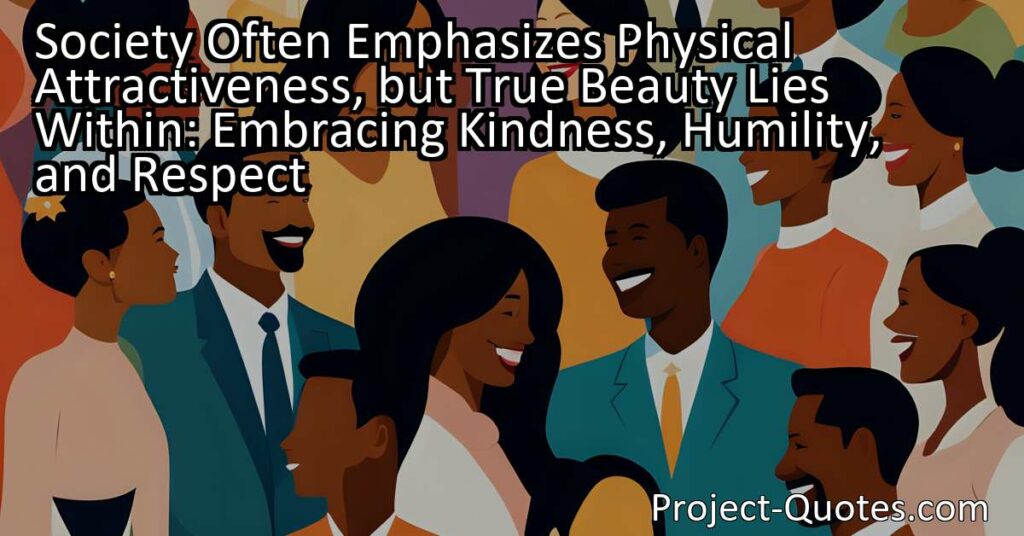No person who is well bred, kind and modest is ever offensively plain; all real deformity means want for manners or of heart.
John Ruskin
Society Often Emphasizes Physical Attractiveness, but True Beauty Lies Within: Embracing Kindness, Humility, and Respect In a world where beauty standards are prevalent and ever-changing, it’s easy to feel insecure about our appearance. However, John Ruskin reminds us that true beauty isn’t about how we look, but about how we treat others. While society may prioritize physical attractiveness, it’s important to remember that true beauty comes from kindness, humility, and respect.
Table of Contents
- 1 No person who is well bred, kind and modest is ever offensively plain; all real deformity means want for manners or of heart.
- 2 John Ruskin
- 3 Meaning of Quote – No person who is well bred, kind and modest is ever offensively plain; all real deformity means want for manners or of heart.
- 4 Freely Shareable Quote Image
- 5 Related
Meaning of Quote – No person who is well bred, kind and modest is ever offensively plain; all real deformity means want for manners or of heart.
In the great world we live in, where beauty standards are prevalent and constantly changing, it is easy to feel insecure about our appearance. We may look at ourselves in the mirror and wish for features that we do not possess or compare ourselves to those who we perceive as more attractive. However, the wise words of John Ruskin remind us that our true beauty lies not in our physical appearance, but in the way we carry ourselves and treat others.
According to Ruskin, a person who is well bred, kind, and modest can never be offensively plain. This statement holds profound meaning, suggesting that it is our manners and the goodness within our hearts that truly define us, rather than our external appearance. While society often emphasizes physical attractiveness, it is essential to remember that outward beauty can only take us so far. True beauty is not merely skin-deep; it is a reflection of our character and actions.
Let’s explore this idea further by examining the first part of Ruskin’s quote: “No person who is well bred, kind and modest is ever offensively plain.” Here, Ruskin implies that individuals who possess qualities such as good manners, kindness, and modesty will never be perceived as unattractive, regardless of their physical features. This notion challenges society’s obsession with superficial beauty and highlights the importance of inner qualities that radiate outward.
Consider someone you know who may not fit society’s conventional standards of beauty but possesses remarkable manners, kindness, and modesty. They have the ability to light up a room simply by being themselves. People are drawn to their genuine and warm nature. They exude a certain charm and appeal that surpasses any physical shortcomings they may have. This is a testament to the power of good character, which can transform how others perceive us and ultimately how we perceive ourselves.
Ruskin goes on to suggest that “all real deformity means want for manners or of heart.” With this statement, he asserts that any perceived physical deformities are indicative of a lack of manners or a deficiency in the heart. While this may seem harsh at first glance, a deeper understanding of his words reveals a profound truth. It is not physical appearance alone that determines someone’s attractiveness, but rather how they interact with the world around them.
Think about it: have you ever encountered someone who may possess conventional physical beauty but behaves in a manner that is disrespectful, arrogant, or cruel? Despite their physical attractiveness, their true colors shine through, rendering them unappealing and unattractive. This affirms Ruskin’s belief that outer appearance can be deceiving, and what truly matters is the way we treat others and conduct ourselves.
When we focus on developing good manners, being kind-hearted, and embracing modesty, we inherently enhance our own beauty. These qualities radiate from within, making us more attractive to others and, most importantly, to ourselves. It is the genuine kindness we extend to others, the respect we show, and the humility we display that sets us apart and contributes to our overall appeal.
Imagine a world where people valued inner beauty as much as they valued physical appearance. Such a world would be a more compassionate and understanding place, where true connections could be formed and friendships could thrive. Our self-worth would no longer be tied solely to our appearance, but rather to the content of our character.
It is worth noting that beauty standards are subjective, ever-changing, and often unattainable for many. By placing excessive importance on these external standards, we inadvertently perpetuate a culture of comparison, competition, and dissatisfaction. Ruskin’s perspective challenges this narrative and offers a fresh perspective that focuses on the qualities that truly matter, reminding us that our inherent worth is not determined solely by our physical appearance.
To conclude, John Ruskin’s quote serves as a reminder that a person’s true beauty lies within their manners and the goodness of their heart. It encourages us to shift our focus from the external to the internal, from physical appearance to character. Only by embracing kindness, humility, and respect can we truly become the most beautiful versions of ourselves. Let us strive to cultivate these traits and appreciate the unique and genuine beauty that resides within each one of us.
I hope this quote inspired image brings you hope and peace. Share it with someone who needs it today!


